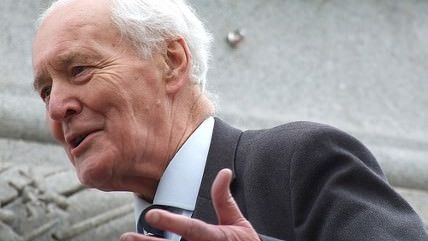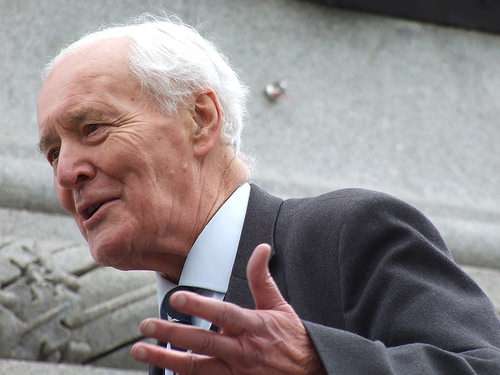Tony Benn: a Socialist I Liked


Today it was reported that Tony Benn, the British Labour Party veteran, had died at the age of 88. I'm sad that he is gone, and I'll miss his always interesting and uncompromising commentary on British and global affairs.
Benn had a long and eventful career in British politics, having become a member of parliament at the age of 25 and serving as a cabinet minister under Prime Minister Harold Wilson and James Callaghan. He inherited the title of Viscount Stansgate from his father, which he later renounced, perhaps not wanting to join what he described as the "British Outer Mongolia for retired politicians."
Some readers might think it strange for a libertarian to say that he will be missing a dedicated socialist, but I'm a sucker for great rhetorical skill, which the Labour Party has almost none of these days, and I feel like I have lost an ally on the issues of national sovereignty and peace.
On his blog at The Telegraph, British Conservative member of the European Parliament Daniel Hannan wrote that he found himself "choking up" when he heard of Benn's death, and notes that despite his absurd views on economics, Benn opposed institutions such as the monarchy and organizations such as the European Union, NATO, and the House of Lords because of their undemocratic nature. Hannan also notes that Benn was no fan of the Soviet Union, and that, "His socialism was authentically British, rooted in brass bands and the temperance movement and working men's libraries. He never had much time for the bloodthirsty creeds of foreign enthusiasts."
As well as standing up for democratic rights, Benn was a staunch anti-war campaigner, having opposed the Suez war, the Falklands war, and both U.S.-led wars in Iraq. Benn felt so strongly about the war in Iraq that he had no problem saying that Tony Blair, a fellow member of the Labour Party, had committed a war crime.
Benn kept diaries throughout much of his life, and thankfully many of them have been published. One day while I was an undergraduate in Reading, England, I walked into a bookstore to browse. I picked up one of Benn's diaries and read a page at random. An hour later I was still at the store, sitting down next to the bookshelf, still reading. I am aware that this was bad book store etiquette, but Benn lived an amazing life, and he wrote about it very well.
Anyone who has been paying attention to British politics in the last few years must have noticed that the Labour Party does not have many great speakers within its ranks. Every Wednesday at noon, Labour Party Leader Ed Miliband stands in the House of Commons and asks Prime Minister Cameron questions and oftentimes makes the theatre of Prime Minister's Question boring, something I used to think was next to impossible. It is not just Miliband. This week's Prime Minister's Questions featured Deputy Prime Minister Nick Clegg (who was standing in for Cameron, who was in Israel) and Deputy Leader of the Labour Party Harriet Harman. Harman did better than Miliband, but is still not nearly as impressive as Benn, who knew how to work the famously combative House of Commons.
Looking around the Labour Party, and the British socialist movement more broadly, it is impossible to find anyone that could come close to filling the space left by Benn, a fact that is both a testament to Benn but also to the sorry state of the British left.


Show Comments (45)